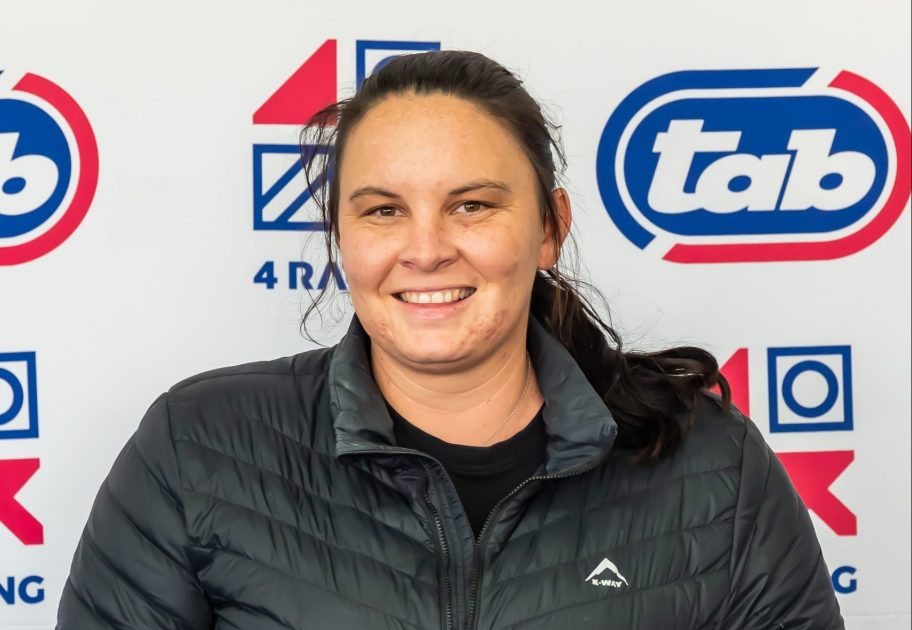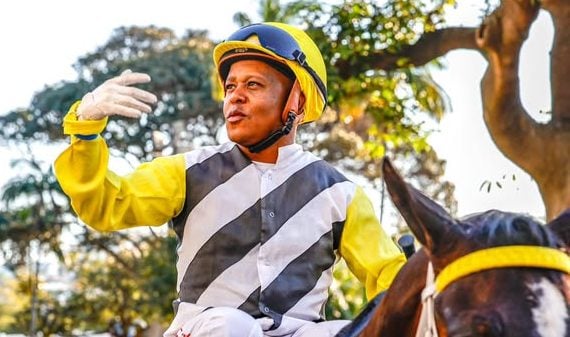A Gqeberha trainer has come out with an unprecedented transparency plea for the National Horseracing Authority to furnish TC02 testing results and make these available in black and white to alleged offenders.
TC02 testing has been the source of some controversy, despite the obvious good intentions by the racing regulator to level the playing fields.
But it’s just too vague, complicated and secretive, it seems.

Kelly Mitchley – frustrated with the process (Pic – Pauline Herman)
Kelly Mitchley had the disappointment of seeing her 8yo Mount Anderson withdrawn at 15h45 on Friday as a result of elevated TC02 levels from the Betway Algoa Cup.
A winner of the Friendly City Stakes at his last start, Mount Anderson has been in Kelly’s stable for 3 years.
“Can the Stipes please explain the results. It takes a lot of time and effort getting our horses ready for a big raceday. The funny thing is that they take a test and tell us verbally that the horse is over the limit then retake the test again for a second time. The Stipes refuse to show us the test results. Only they may see it – for what reason I don’t understand. It’s like they own the horse! We have a big race come around once a year and then this. I want to know what is over the limit. I would like to see with my own eyes and not just being told we are over the limit,” she added.
The National Horseracing Authority published an update at end September on the Total Carbon Dioxide (TCO2) analysis conducted on race days. Between 29 June 2024 and 29 September 2024, 2 772 TCO2 analyses were administered on 2 482 horses.
Of these, 274 horses (11%) tested above 35 mmol/L, as a result of which, was subjected to a second test on the expiry of no less than 10 minutes post the first test, with 16 horses (0.6%) being withdrawn from races due to elevated TCO2 levels, i.e. levels on such second test exceeding 37 mmol/L.
From 6 April 2024 to 29 September 2024, a total of 4 998 TCO2 analyses were administered on 4 509 horses.
During this period, 57 horses (1.3%) were withdrawn from their respective races, which include 3 horses scratched on more than one occasion.
The remaining 4 452 runners had TCO2 levels with an overall mean of 33.1 mmol/L and a standard deviation of 1.7 mmol/L. In a normally distributed population, this suggests that 68% of horses will have a TCO2 level between 31.4 and 34.8 mmol/L, 95% will range between 29.7 and 36.5 mmol/L, and 99.7% will fall between 28 and 38.2 mmol/L. These results are consistent with data communicated on 28 June 2024.
To reduce the number of horses requiring a second test, and in an effort to ensure that the above 99.7% normal population of horses is catered for, the following new specimen collection procedures for TCO2 analysis will be implemented on race days, with effect from 1 October 2024:
TRAINERS will, prior thereto, be notified of the HORSES selected for pre-race TCO2 testing and ANALYSIS.
A blood SPECIMEN will be collected from each selected HORSE approximately 60 minutes prior to the published RACE time. Immediate ANALYSIS will be performed by means of an NHA approved handheld blood gas analyser “the first test”.
Where such ANALYSIS shows that a HORSE has a TCO2 concentration of more than 36 mmol/L, a second blood SPECIMEN “the second test” will be collected, a minimum of 10 minutes after the first test.
If the TCO2 concentration of the second blood SPECIMEN is more than 38 mmol/L, the STEWARDS shall withdraw the HORSE from the RACE and detain the HORSE for additional SPECIMEN collection.
Under these circumstances, a third blood SPECIMEN will be collected a minimum of 30 minutes after the second test.
The STEWARD/S may, at their sole discretion, instruct a SPECIMEN COLLECTOR to subsequently collect further SPECIMENS from the HORSE, for inter alia analytical testing of all PROHIBITED SUBSTANCES.
The STEWARD/S will notify the race day commentator of any HORSE which is passed to run, which underwent a second test.
As the season progresses, the NHA state that they remain committed to maintaining the highest standards of transparency and testing integrity.
These procedural enhancements will allow the NHA to increase the number of horses tested pre-race.
Additionally, TCO2 analysis will extend to out-of-competition specimens collected from stable yards, based on intelligence, to further develop the TCO2 biological passport for each horse. This passport will enable the regulator to analyze and track TCO2 levels over time for every horse tested.
Interestingly, when testing started, races were selected for testing. These days, random horses are selected. This lends credence to speculation of alleged victimisation of certain trainers. Whether true or not, it’s the perceptions that do the harm.








